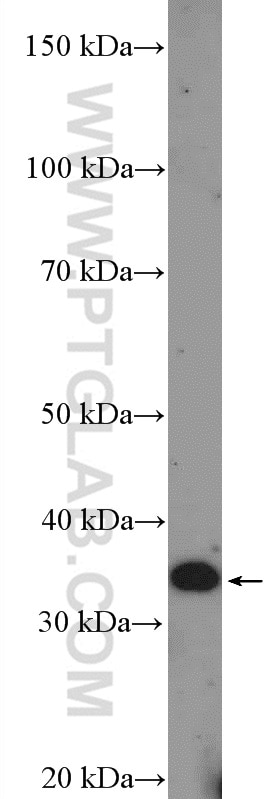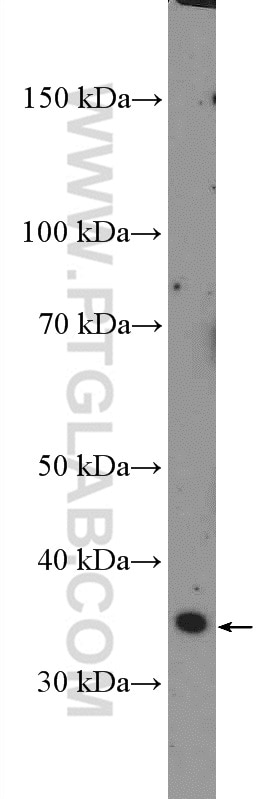Anticorps Polyclonal de lapin anti-DCUN1D3
DCUN1D3 Polyclonal Antibody for WB,ELISA
Hôte / Isotype
Lapin / IgG
Réactivité testée
Humain
Applications
WB,ELISA
Conjugaison
Non conjugué
N° de cat : 26356-1-AP
Synonymes
Galerie de données de validation
Applications testées
| Résultats positifs en WB | cellules MCF-7, cellules A549 |
Dilution recommandée
| Application | Dilution |
|---|---|
| Western Blot (WB) | WB : 1:500-1:2000 |
| It is recommended that this reagent should be titrated in each testing system to obtain optimal results. | |
| Sample-dependent, check data in validation data gallery | |
Informations sur le produit
26356-1-AP cible DCUN1D3 dans les applications de WB,ELISA et montre une réactivité avec des échantillons Humain
| Réactivité | Humain |
| Hôte / Isotype | Lapin / IgG |
| Clonalité | Polyclonal |
| Type | Anticorps |
| Immunogène | DCUN1D3 Protéine recombinante Ag23730 |
| Nom complet | DCN1, defective in cullin neddylation 1, domain containing 3 (S. cerevisiae) |
| Poids moléculaire observé | 34 kDa |
| Numéro d’acquisition GenBank | BC040442 |
| Symbole du gène | DCUN1D3 |
| Identification du gène (NCBI) | 123879 |
| Conjugaison | Non conjugué |
| Forme | Liquide |
| Méthode de purification | Purification par affinité contre l'antigène |
| Tampon de stockage | PBS avec azoture de sodium à 0,02 % et glycérol à 50 % pH 7,3 |
| Conditions de stockage | Stocker à -20°C. Stable pendant un an après l'expédition. L'aliquotage n'est pas nécessaire pour le stockage à -20oC Les 20ul contiennent 0,1% de BSA. |
Informations générales
DCUN1D3, also named as SCCRO3, is proposed to function as a tumor suppressor. DCUN1D3 antagonizes DCUN1D1-mediated CUL1 neddylation by sequestering CUL1 at the cell membrane (PubMed:25349211). When overexpressed in transformed cells, DCUN1D3 may promote mesenchymal to epithelial-like changes and inhibit colony formation in soft agar (PubMed:25349211).
Protocole
| Product Specific Protocols | |
|---|---|
| WB protocol for DCUN1D3 antibody 26356-1-AP | Download protocol |
| Standard Protocols | |
|---|---|
| Click here to view our Standard Protocols |



